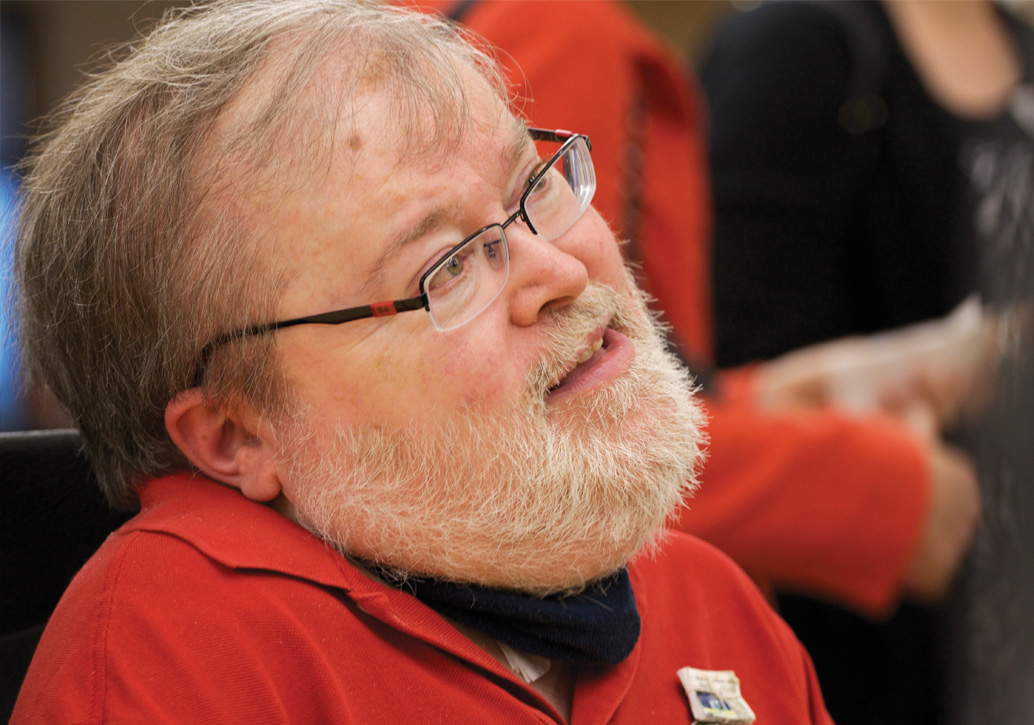A Life Lesson to Treasure
By Stephen Trumper
There’s a wonderfully loopy Monty Python sketch about the Hell’s Grannies, a gang of grey-hairs who terrorize the town, stealing, vandalizing and causing no end of geriatric mayhem, each attack ending with a surprisingly quick getaway.
As a boy I had my own surprise encounters with Getaway Grannies. Mine, though, were benevolent. They gave me cash: quarters, nickels, dimes, even a 50¢ piece, whatever they could quickly snare from their change purses, and press into my palm. “Buy yourself a treat,” they’d say, before scampering off.
I often think about what, exactly, was going through their minds at the moment they saw me. Back then I was something unusual on the landscape: a limping, lurching “crippled” lad who could be spotted from a block away.
So I got stares, as many as a newborn polar bear in the zoo. And a still-troubling number of taunts, insults and threats from other kids. But not from my Grannies.
They clearly wanted to show support and while it is easy to view their “gifts” and gestures as patronizing acts of pity from the telethon era (as I did for a time) I now see them for what they were: genuine acts of kindness awkwardly expressed.
It is impossible to grow up disabled and not be aware of how much people want to help, of how much they do help. There are armies of them out there, all mobilized to do good. My life has been enriched beyond measure by human generosity, be it through simple gestures or serious commitments of time and energy.
There is a downside, however, to being the object of so much attention, so much help, especially for disabled kids: it can enhance self-centredness, bringing with it a lack of compassion for others.
I once had the honour of meeting Prince Edward, the Queen’s youngest son. It was at a lunch with members of the disability community and, among other topics, including a hilarious story about the sky dive of a blind executive at the British version of the CNIB, the Prince discussed one particular element of the Duke of Edinburgh Awards: service to others.
He noted this requirement was a challenge for many of the applicants with disabilities, who at this crucial time in their young lives (ages 14 to 25) were much more used to receiving than giving. In many ways, added the Prince, participating in community service was a revelation to them.
I’m fortunate to have had parents who, through their beliefs and actions, showed to me the immense personal satisfaction that comes from lending a helping hand.
Dad and Mom, though, were not hopelessly dewy-eyed about giving and accepting help. They knew—and I would soon discover—that giving or receiving often comes with complications: that volunteering can be frustrating and thankless; that the helping professions — doctors, social workers, nurses, physios, PSWs, etc. — are often not terribly helpful; that unconditional help can be hard to find.
Understanding all this has been no end of, well, help in deciphering the actions of my Getaway Grannies.
And in treasuring my mother’s lasting legacy to me:
It came during the final years of her life. Mom, once a vibrant primary school teacher, had fought a long, losing battle with schizophrenia. At the time she lived in a specialized residence, along with others with mental-health concerns, where she was kept safe and her meds could be monitored.
It was gut wrenching to watch her decline and heartbreaking to place her there. It could easily be viewed as a home without hope. But that depends on how you define hope. For me, as I reflect on her life 35 years after her death, I remember moments of great joy, of considerable triumph and, at a point when all might seem lost, my Mom, on those days when the meds were all in synch, did something that still takes my breath away.
She went back to her teacher roots and—an indication of just how deep and strong the human desire to help runs — she began helping some housemates relearn how to read and write.
I only learned of this “gift” years after her passing, a final lesson to her disabled son: that no matter what unhappy twists and turns a life can take, there’s still pleasure to be found in, as my own British Granny would say, extending a cup of kindness.
Stephen Trumper serves on the board of the Canadian Abilities Foundation. He is an independent writer and editor associated with Accessible Media Inc. (AMI) and is also a journalism instructor at Ryerson University.














